What remains of the Battle of Algiers?
The 1966 film, the Battle of Algiers depicts the armed struggle for the liberation of Algeria that would eventually gain its independence from France in 1962.
The film, directed by Gillo Pontecorvo and influenced by other works of Italian neorealism, depicts the growth of the Algerian liberation movement, the National Liberation Front (FLN) and its crackdown by French insurgency in the Casbah region of Algiers.
Although the French insurgency, by use of torture and ruthless crackdowns appeared to be victorious, with the hero of the film being killed in penultimate scenes, the finale presents documentary-like footage of popular uprising of Algerians bursting through French barricades and claiming their independence.
The film and the anti-colonial ideology of philosopher Franz Fanon that was embedded in the film's message, influenced liberation movements at that time, from what is viewed as the "golden age" of the Palestinian revolution, to Irish republicans and the black panthers in the US.
Some have pointed out that much of the militant-leftist ideology, that influenced the struggles for independence and against colonialism and mandates in the 60s, was curiously absent in the Arab uprisings.
It has been answered that these earlier movements were struggles for independence, whereas the Arab Spring was an internal struggle for rights against indigenous dictators.
 |
|
Yet the Algerian war for liberation was fought, not just in national, but also in class terms, with popular criticism against the "national bourgeoisie", a class of Algerians who profitted from the French occuption - a central talking point in Fanon’s work.
The battle of Algiers depicts the FLN attacking those collaborating in various ways with the French.
Now, leaders with close ties to Western governments, such as the Palestinian Authority, or the military in Egypt, who take the majority of their funding from the US, manage to convince much of their population of their anti-colonialism through strident rhetoric.
Additionally, Academics and analysts have noted that class-discourse was not as prominant in Arab uprisings where groups eventually formulated themselves upon the basis of identities - ethnic, religious, liberal - rather than class.
Fanon said the oppressed man has to be transformed into "citizen-soldier" through violence, as we can see in the tactics of the guerilla movement in the Battle of Algiers.
Yet there was none of this militant organization on display in street clashes in Egypt or a messy internal civil war in Syria and Libya; the violence on display in the Arab spring and the years following was not means to an end, beginnings of a viscous cycle.
In the case of groups like the Islamic State, some have said violence appears to be the end in itself.
Whereas Fanon said that violence can psychologically cleanse the oppressed and colonized, the violence consuming the Middle East appears to lack any psychological healing.
Although some contemporary Arab leftists romanatize the era of the 60s and the "Battle of Algiers", like many former revolutionary movements that fought against colonialism, such as Fatah, the FLN developed into an authoritarian reactionary government that would give rise to Islamist opposition movements and the 1991 Algerian civil war.
A reviewer described the “Battle of Algiers” as a "self-image" of revolution, rather than a true depiction of the revolution itself.
 |
|
Within “liberal” contemporary Arab revolutionary circles, a radically different idea of activism has taken route, as academic Jon Alterman pointing out that "producing content" on social media, film, writing – rather than organization or action - is now viewed as activism, or even revolutionary activity.
The Egyptian activist film collective "Mosireen" documented on film much of the Egyptian revolution and the clashes with the military that followed suit.
Much of Mosireen’s footage culminated in the Oscar winning documentary, "the Square" that depicted the struggle of two protagonists during the Egyptian revolution and its aftermath.
The film has been compared to the "the battle of Algiers".
Yet, whereas the battle of Algiers depicted a revolution that made history and lead to structural and material change in Algeria, in contemporary Egypt, as is commonly attested to, little has materially changed since the eighteen days of the revolution in 2011;
Everyday life remains the same for millions of Egyptians, under the same oppressive institutions. And the violence of repressive government policies - such as economic austerity - will not be caught on camera as easily as the violence of the police was during the cinematic revolution in 2011.
And where structual change has not taken place, the revolution's hopeful legacy remains in the realms of "content" and cultural output - in videos, pictures, stories...and films.
In this way, maybe, the Battle of Algiers and the liberation movements and militant ideologies of the sixties also inspire narratives and nostalgia - not revolutions.



![sudan women [getty] sudan women [getty]](/sites/default/files/styles/image_330x185/public/media/images/5019D7F4-52AF-4377-8A05-885D27476479.jpg?h=d1cb525d&itok=tKXV7r-W)